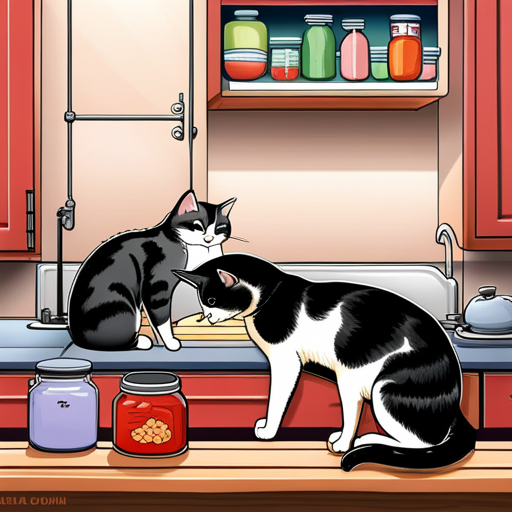Imagine you’ve stumbled upon a video showcasing a cat eagerly devouring a small portion of kimchi, leaving you pondering the safety and health implications of such a diet choice for felines.
As a professional, you understand the importance of a balanced diet for cats, but the inclusion of fermented foods like kimchi raises questions. Kimchi’s ingredients and their effects on cat health, alongside expert opinions, offer a complex landscape to navigate.
You’ll find the exploration of potential risks and viable alternatives to kimchi for cats compelling, prompting a deeper look into what truly constitutes a nutritious diet for our feline friends.
Key Takeaways
- Kimchi contains garlic and onions, which are toxic to cats and can cause health issues.
- The high salt content and spices in kimchi can be harmful to cats’ delicate digestive systems.
- Veterinary experts advise against feeding kimchi to cats due to its spicy and fermented nature.
- Healthy alternatives for cat treats include commercially available cat-specific foods and vet-approved homemade recipes.
Understanding Cat Nutrition
To ensure your cat’s health and vitality, it’s crucial to understand that their nutritional needs are distinctly different from those of humans, requiring a careful balance of specific nutrients. Cat hydration and protein sources are particularly vital components of this balance. Your cat’s body is highly tuned to metabolize protein as a primary energy source, unlike humans, who utilize carbohydrates more efficiently. Thus, it’s essential to provide them with high-quality protein sources, such as chicken, turkey, and fish, which are rich in the amino acids crucial for their health.
Moreover, cats naturally have a low thirst drive, which means they don’t drink water as often as they should. This trait stems from their ancestors, who derived most of their hydration from their prey. Therefore, ensuring your cat receives adequate moisture through their diet is paramount. Wet food can significantly contribute to their total water intake, supporting kidney and urinary tract health. Being cautious about your cat’s hydration is especially important if they primarily consume dry food, as this may necessitate encouraging more frequent water consumption through additional means, such as water fountains designed for pets or adding water to their food.
What Is Kimchi?
Understanding your cat’s nutritional needs is crucial, and now we’ll explore whether kimchi, a traditional Korean dish made primarily from fermented vegetables, fits into a healthy diet for your feline friend. Here’s a detailed look at kimchi:
- Kimchi Origins: Tracing back centuries, kimchi is a staple in Korean cuisine, showcasing a rich cultural heritage. It began as a means to preserve vegetables for the winter months. Over time, it has evolved into various forms, with each region in Korea offering its unique take on the dish.
- Fermentation Process: At the heart of kimchi’s preparation is the fermentation process, which involves lacto-fermentation. Here, beneficial bacteria (mainly Lactobacillus) convert sugars into lactic acid, acting as a natural preservative. This process not only extends the shelf life of the vegetables but also enhances their nutritional profile by increasing beneficial bacteria, which are good for gut health.
- Nutritional Aspects: While kimchi is praised for its probiotic qualities in humans, understanding its composition is vital before considering it for cats. The fermentation process, although beneficial for humans, introduces complexities when assessing its suitability for feline consumption.
In essence, while kimchi’s rich history and fermentation process make it an interesting food for humans, its appropriateness for cats requires careful consideration.
Ingredients in Kimchi and Cat Health
When exploring the impact of kimchi ingredients on cat health, it’s crucial to note that several components may pose risks to your pet’s well-being. The kimchi fermentation process, while beneficial for human digestive health, introduces a complex mix of bacteria and acids that may not align with your cat’s digestive system. Cats have specific dietary needs and introducing fermented foods like kimchi can disrupt their gut flora, leading to digestive discomfort or more serious health issues.
Moreover, ingredients commonly found in kimchi, such as garlic and onions, are toxic to cats. Even in small amounts, these can cause gastrointestinal upset or lead to conditions like hemolytic anemia. It’s also worth considering that cats can develop dietary allergies. Ingredients in kimchi, aside from being potentially toxic, might trigger allergic reactions in some cats. These reactions can range from mild to severe, including symptoms like itching, swelling, or digestive distress.
Given these considerations, it’s apparent that while kimchi is a nutritious option for humans, its ingredients can be harmful to cats. Always prioritize your cat’s specific dietary requirements and consult with a veterinarian before introducing new foods into their diet.
Potential Risks of Kimchi for Cats
Considering the ingredients in kimchi and their effects on cat health, it’s crucial to explore the specific risks this food may pose to feline well-being. While kimchi may be a healthy and flavorful addition to human diets, it’s essential to understand that what’s beneficial for you mightn’t be safe for your cat.
Here are three key concerns to consider:
- High Salt Content: Kimchi contains significant amounts of salt, which can lead to dehydration and salt poisoning in cats. Their bodies aren’t designed to process a high sodium diet, making kimchi a potential health hazard.
- Garlic and Onions: Both are common in kimchi recipes and are toxic to cats. Even in small amounts, these ingredients can cause anemia by damaging red blood cells, leading to serious health issues.
- Kimchi Allergies and Digestive Reactions: Cats may exhibit allergic reactions to specific components in kimchi. Moreover, the spicy and fermented nature can cause digestive reactions, including upset stomachs, diarrhea, and vomiting. Cats have delicate digestive systems, and introducing foreign, complex foods like kimchi can disrupt their normal gastrointestinal function.
It’s clear that feeding kimchi to cats carries risks that pet owners should be mindful of to ensure their pets’ health and safety.
Expert Opinions on Cats and Kimchi
Veterinary experts advise against feeding kimchi to cats due to its potential health risks. The spicy, fermented nature of kimchi, while a staple in human diets across various cultures, doesn’t align with the nutritional needs of felines. Experts warn that the high salt content and spices found in kimchi can lead to digestive upset, dehydration, and in severe cases, sodium ion poisoning in cats.
Moreover, the inclusion of garlic and onions, common in many kimchi recipes, poses a significant risk. These ingredients are toxic to cats, leading to potential red blood cell damage and anemia. It’s crucial to understand that cats’ feeding behaviors and dietary requirements differ vastly from humans. Their bodies aren’t designed to process such complex, heavily seasoned foods.
Cultural perceptions might lead some pet owners to share their meals with their pets, believing it to be a form of bonding or assuming what’s healthy for humans is also beneficial for cats. However, this practice can inadvertently harm your feline friend. Instead, stick to cat-specific diets that cater to their nutritional needs, ensuring they lead healthy, happy lives.
Alternatives to Kimchi for Cats
Understanding the risks associated with feeding kimchi to cats, it’s crucial to explore safe, nutritious alternatives that cater to their dietary needs. While kimchi’s spicy and fermented nature poses health risks to felines, incorporating carefully selected ingredients can ensure they receive beneficial nutrients without harm.
Below are three scientifically-informed, detailed, and cautious alternatives:
- Cat Probiotics: Commercially available cat probiotics are specifically formulated to support feline gut health. Unlike kimchi, these supplements are designed with your cat’s digestive system in mind, ensuring they receive the right balance of beneficial bacteria without the risk of dietary upset.
- Homemade Recipes: Preparing homemade meals for your cat can be a safe alternative, provided you follow recipes vetted by veterinary nutritionists. Ingredients such as cooked, unseasoned meats, and certain vegetables, can offer a balanced diet. Always avoid onions, garlic, and excessive fats.
- Specially Formulated Wet Foods: Many high-quality wet foods are fortified with probiotics and tailored to a cat’s nutritional needs. These products provide the moisture and nutrients cats require, without the risks associated with human foods like kimchi.
Conclusion
In sum, while your feline friend might be curious about your culinary adventures, it’s best to keep the kimchi to yourself. The spicy symphony of flavors, although delightful to human taste buds, mightn’t sit well in your kitty’s delicate digestive system.
Instead, consider more cat-friendly treats that align with their nutritional needs. Remember, sharing isn’t always caring, especially when it involves our furry companions’ health.
Let’s keep their meals simple and safe, ensuring they remain the purring picture of health.

